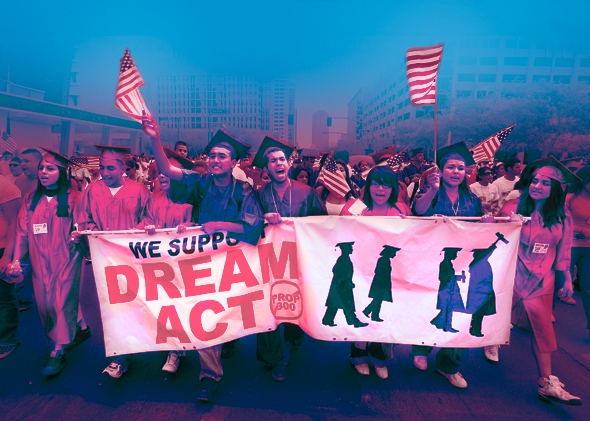Amnesty Is Not the Answer
Our current notion of comprehensive immigration reform will boomerang on future generations.

Photo illustration by Lisa Larson-Walker. Photo by Reuters.
This article is part of a series presented by the American Prosperity Consensus in partnership with Slate. To read all the stories in the series, click here.
Over the next two decades, immigration will be a defining issue for America. Immigration strengthens our country and is especially important as native-born Americans have fewer children. A major driver of population growth between now and 2040, in fact, will come from immigration. But it is necessary to differentiate between legal and illegal immigration, and that’s why how we reform the immigration system will determine our nation’s future.
Immigration, of course, also helps those who come here. America is a place of tremendous opportunity for those who seek to work hard and obey the law, and people around the world have taken note. As a result, America has been—and can continue to be—the most attractive destination for immigrants. From Andrew Carnegie to Sergey Brin, many of the greatest American entrepreneurs have been immigrants.
Yet our current system’s bureaucratic delays discourage legal immigration. Likewise, restrictions on those most ready and able to contribute immediately to the economy and the government’s fiscal health—those with in-demand skills and advanced education—in turn restrict America’s ability to benefit from immigration. At the same time, granting amnesty to those who have circumvented the system does a disservice to everyone. It’s vital that we know who is in the country and restrict entry for those who threaten national security, which is why embracing amnesty for those here unlawfully—something enacted in 1986 and proposed again in the Senate’s “comprehensive” approach—would be unfair, costly, and unworkable.
First, it’s unfair because of those already in line. Under our current system, in which we don’t really enforce the law, those who respect the law and wait to come are languishing in line. Those without such scruples are allowed to reside here and ultimately get legal status.
Second, it’s costly because of the generous welfare state. Nobel Prize–winning economist Milton Friedman explained that a nation can’t have both open borders and a welfare state. The share of federal expenditures going to transfer payments (from Social Security, unemployment insurance, and so on) has skyrocketed from 3 percent to 66 percent since 1935. The less-educated tend to have lower incomes and thus receive far more in benefits and services than they pay in taxes; the average illegal immigrant has a 10th-grade education. We can’t afford to worsen our already unsustainable entitlement and welfare programs by allowing unlawful immigrants access to the full panoply of benefits.
Third and last, amnesty is unworkable because it sets us up for more of the same. When Congress and President Reagan granted amnesty in 1986 to some 3 million people, the package included promises to limit future illegal immigration. Those promises didn’t come to fruition, and today we have more than 10 million illegal immigrants.
In predicting the results of the comprehensive immigration reform bill passed by the Senate and sent on to the House, the Congressional Budget Office concluded the legislation would reduce illegal immigration by as little as one-third. That means millions would defy the law to enter the country or stay here—and more than likely we’ll be debating another amnesty within a generation. Instead, President Obama should enhance border measures and follow through on the promises of interior enforcement.
America should welcome immigrants from around the globe. In particular, we should welcome those in high-demand occupations such as agriculture (where there indeed may be a labor shortage) and those with higher education (who likely will pay more in taxes than they receive in benefits and services).
Immigration is a defining issue for the future of our country. However, we need to make sure immigration reform is done correctly so as not to create further drag on an already heavily burdened system. As we look toward 2040, the U.S. must recognize that we can make immigration reform a priority without amnesty.
What do you think is the most pressing issue facing the United States over the next generation? Have your say in the comments section by clicking on the “comment” icon. Your contribution will help define the American Prosperity Consensus project. You can follow the project at america2040.com.